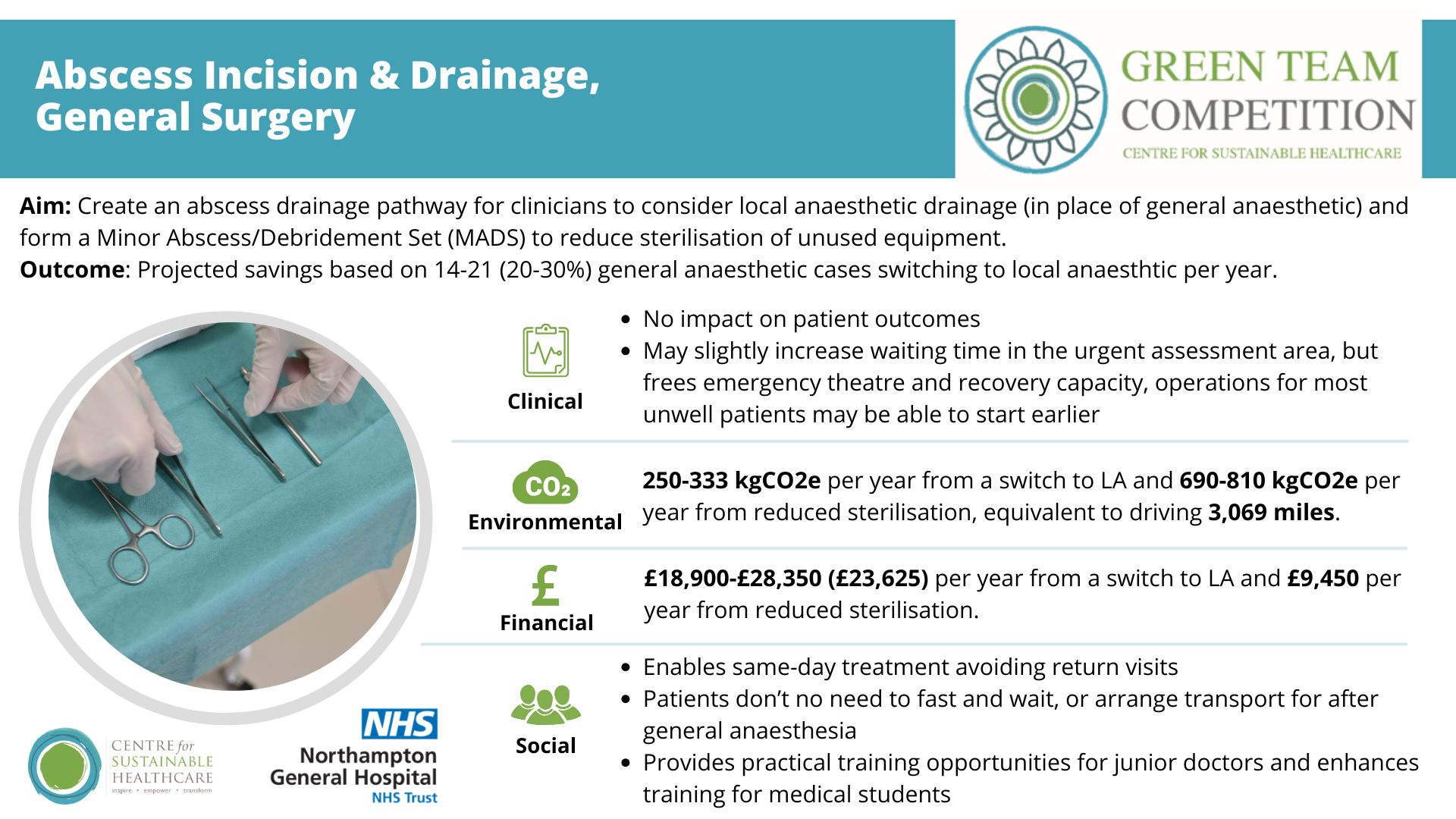Project completed as part of the Northampton General Hospital NHS Trust Green Team Competition 2024-25.

Team members:
Mr Amari Thompson – General Surgery & Chief Registrar
Mr Jatinder Singh – General Surgery Registrar
Dr Arya Krishnan – Vascular Surgery Registrar
Miss Reem Moussa – Core Surgical Trainee
Mr Guy Finch – General Surgery Consultant
Setting / patent group: General Surgery
Issue:
Abscess drainage is often performed under general aesthesia (GA), but, given their size and location, many may be done under local anesthetic (LA). There are substantial equipment and medication requirements for GA cases, such as single use disposable items and anesthetic gasses, which have an environmental and financial impact. There are also opportunity costs to the patient such as the costs of going to theatre and risk of general anesthesia. A Minor Abscess/Debridement Set (MADS) of only essential instruments could be used for simple abscess drainage or wound debridement to reduce demand of sterile service and increase time efficiency.
Intervention:
Two major aims are proposed: first, to form a Minor Abscess/Debridement Set (MADS) to reduce steralisation of unused equipment, and second, to create an abscess drainage pathway to ensure clinicians consider local anesthetic drainage and offer it to appropriate clients. To develop the MADS, an online questionnaire on instrument usage in simple abscess drainages was sent to surgical teams and responses were collected and analysed. Theatre management staff and sterile services worked to form the MADS and inform others of its use. To create a new abscess drainage pathway, the existing abscess drainage pathway was considered and procedures performed under general anesthesia and local anesthesia were quantified. Patient concerns about comfort during LA drainage was also considered and effective consenting was determined to be essential in the pathway. The new pathway was approved by the lead for the project, and will be presented to the rest of the department.
Outcomes:
- Environmental
There is an estimated 58.9% reduction in CO2e when compared to GA. Performing more LA abscess drainage procedures will save 250-333 (291.50 kgCO2e per year. Saving equivalent to driving 859 miles in an average car).
The environmental impact of the MADS will be shared soon.
- Social
Performing more procedures under LA would be a benefit for patients in terms of quicker treatment and financial benefit from not having to take multiple days off work. It also would be less stressful than waiting for a GA procedure. For the staff, there is a benefit in freeing up the emergency theatre.
- Clinical
It is anticipated that patients’ health outcomes will largely remain the same under the new abscess drainage pathway.
- Financial
Due to less use of clinical resources and the avoidance of attending theatre, LA abscess drainage would have a cost saving of £1,348 per case for the hospital, saving £18,900-£28,350 (£23,625) per year.
MADS savings will be shared soon.
Key learning point:
Small changes in the management of a common minor surgical emergency can have an impact, particularly if applied regionally or nationally. The key contributor to the project’s success thus far have been in forming links with the theatre management team and with sterile services, which has allowed the creation of the new theatre tray and identification of disused theatre sets. Ongoing input from the theatre team will be invaluable in ensuring the tray is used preferentially for abscess drainage.
Please log in or sign up to comment.